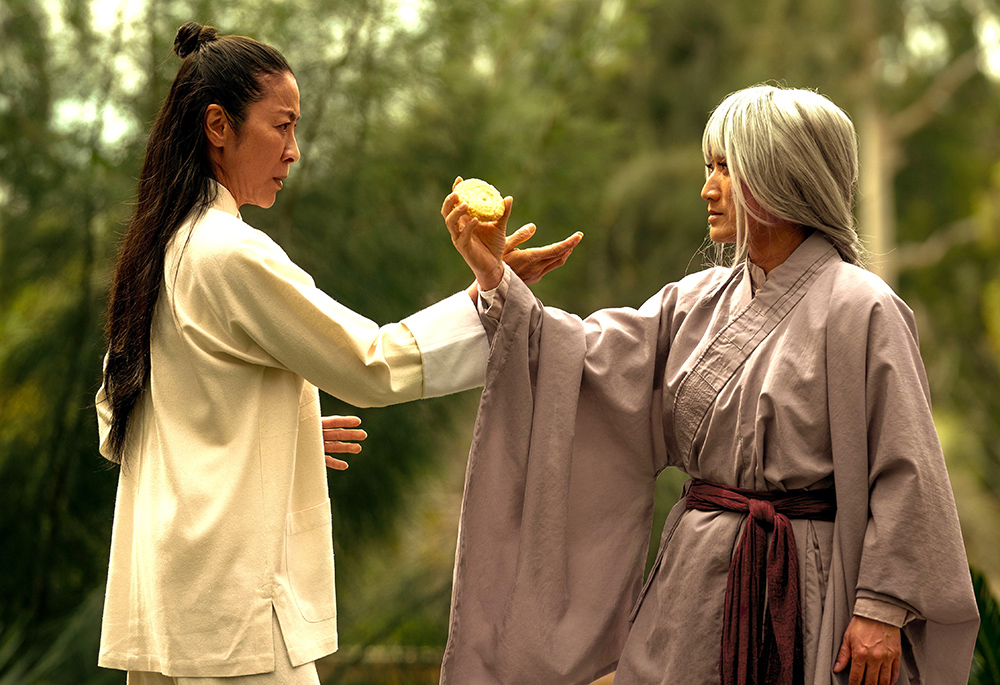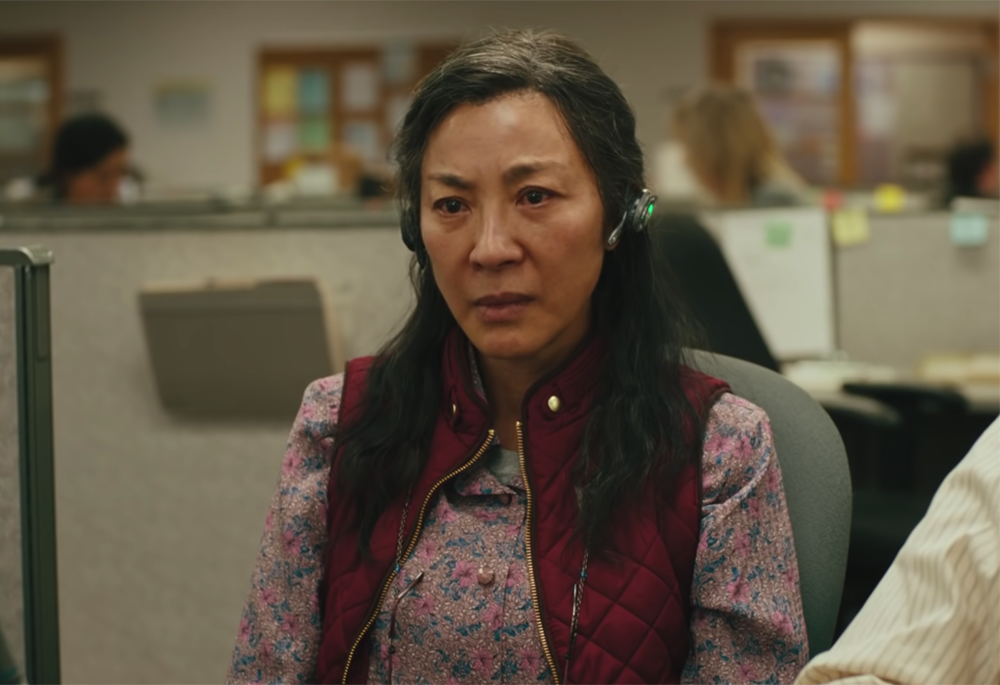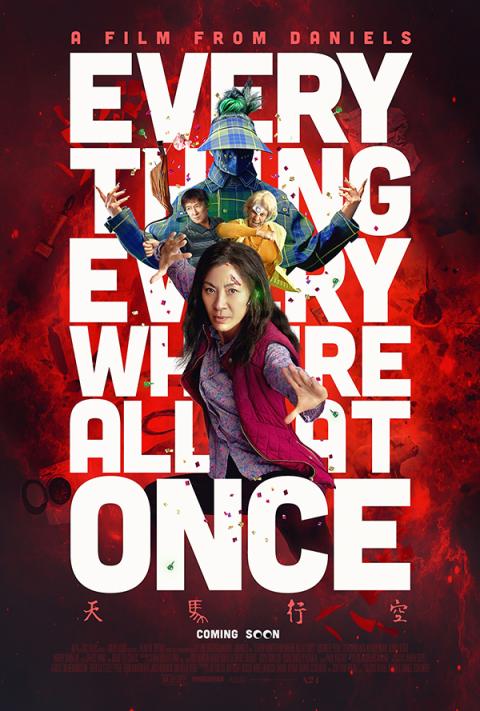
Michelle Yeoh, left, stars in a scene from the movie "Everything Everywhere All at Once." (OSV News/A24)
The sea bass is steaming in the steamer basket while I julienne the scallions and ginger toppings. Meanwhile, the tofu stew bubbles in the pot behind. The ginger in the wok sizzles, its fragrance alerting me that it is time to add the chopped Chinese broccoli. The timer on my phone and on my stove go off at once, and I rush to add cabbage to the stew and then put on oven mitts to remove the steaming sea bass before it overcooks. White rice steams in the rice cooker behind me. It is Lunar New Year, and my kitchen — my life, perhaps — is pure chaos.
I suspect my parents are fighting again, hence my dad choosing to spend his Lunar New Year holiday with me in the United States instead of with the rest of our family in China. He is sitting on my living room couch, holding his phone up for an obligatory "Happy New Year" FaceTime call with his relatives. He taps me on the shoulder as I drizzle scallion oil on the now-plated sea bass.
"No, I don't want to say hi," I mumble, annoyed. My dad's side of the family, who I only see once every five years, speaks a Chinese dialect that I as a Mandarin speaker can barely comprehend. "OK fine … Happy New Year!" I yell loudly into the phone, and turn back to my cooking. My phone buzzes with texts from other family members, filling me in on even more family conflicts. I ignore them.

Michelle Yeoh in "Everything Everywhere All at Once" (NCR screenshot/YouTube/A24)
Across the country, as I would read on the news the following day, two mass shootings happen a day apart within the California Asian American community, both perpetrators being elderly Asian men. Psychologists on the news speak of the intergenerational trauma within Asian American communities that might lie behind the violence: the compounding trauma of war and poverty in one's home country, the journey of immigration, assimilation and poverty in the United States, and the anti-Asian racism that is ever on the rise since the COVID-19 pandemic. When paired with lackluster gun control laws, decades of trauma result in devastating violence.
Where does healing and celebration even begin on this holiday that celebrates families and the joys of life, when trauma and chaos seem ever growing, ever compounding across generations? When fissures in the family, exacerbated by traumas within a community or country, loom ever larger in the narrative of our lives?

Publicity poster for "Everything Everywhere All at Once" (Courtesy of A24 Films, 2022)
The movie "Everything Everywhere All at Once" (2022) also begins in the midst of hectic, everyday chaos that is only exacerbated by the main characters' tense family dynamic across cultures and languages. The main character, Evelyn (Michelle Yeoh), is a graying Chinese American woman who runs a failing laundromat, while living in the apartment above it with her husband Waymond (Ke Huy Quan) and her elderly father (James Hong). Evelyn bickers with Waymond in Mandarin, pronounces loudly in Cantonese to her aging father, while speaking English to her American-born daughter Joy (Stephanie Hsu) whose sexuality and westernized lifestyle Evelyn still struggles to accept.
In the beginning of the movie, Evelyn's already hectic life is shown to be falling apart: her father continues to show his disapproval for her failures in life, including her choice of partner. Waymond quietly prepares to file divorce papers after feeling ignored by Evelyn for decades, all the while Joy grows angrier at her mother for preventing her from introducing her girlfriend Becky (Tallie Medel) to her "Gong Gong" or grandfather. Evelyn's life takes a turn during the IRS audit meeting, where she is recruited by members of the alphaverse to save the entire multiverse from an archnemesis named Jobu Tupaki, who has created a black hole-like bagel that could destroy the multiverse.
From there, Evelyn jumps through multitudes of possible universes — each universe exists in the metaverse because of each different choice Evelyn and others could have made throughout their life — to save her family and the world. The storyline goes back and forth from mundane to absurd, revealing some universes where Evelyn had chosen to stay home rather than move to the United States with her now husband, and other universes where a raccoon lives in the chef hat of her chef colleague, teaching him how to cook in "Ratatouille" fashion.
Evelyn soon learns that the archnemesis Jobu Tupaki is the alphaverse version of her daughter Joy, who had been pushed so hard by the Evelyn of another universe that she verse-jumped to every single potential universe and saw every single conclusion to their lives possible. "Nothing matters," Joy in the multiverse said to her mother. If in the end, all possibilities, lives and relationships will eventually cease to exist, why even waste the effort to try?
Advertisement
Why try to heal, to survive, to love and to reconcile when the odds are always against you in a family already burdened with generations of trauma and division, or in a country whose structures were historically designed to exclude immigrants? Why remain with our families, when the generational and linguistic divide between family members often feels as if we live in different universes?
In a split-second decision at the end of the movie, Evelyn beckons Joy to stay with her instead of pushing the world toward destruction. Evelyn tells us — and we understand — that even if this world will eventually end with failure and nothingness, it is worthwhile to spend every fleeting moment doing laundry, filing taxes and working toward small steps of reconciliation.
This weekend's Academy Awards, where "Everything Everywhere All at Once" is nominated 11 times, take place during the Lenten season — a season of reconciliation, attempted reconciliation and frustrated efforts at failed reconciliations. The movie does not offer a rosy picture of reconciliation, and neither does the story of my own family — or most families, to be fair. Yet it is in the messiness of life, in the fleeting moments of joy amidst chaos, in the times we strive towards what seems impossible, that our lives move closer to healing despite insurmountable trauma.
The healing of my own family and community may also take us across a multiverse — across millions of possible successes and failures that, in the end, may change little to nothing. But for now, my dad is hungry. So I will finish cooking this meal, and sit together, and eat.




